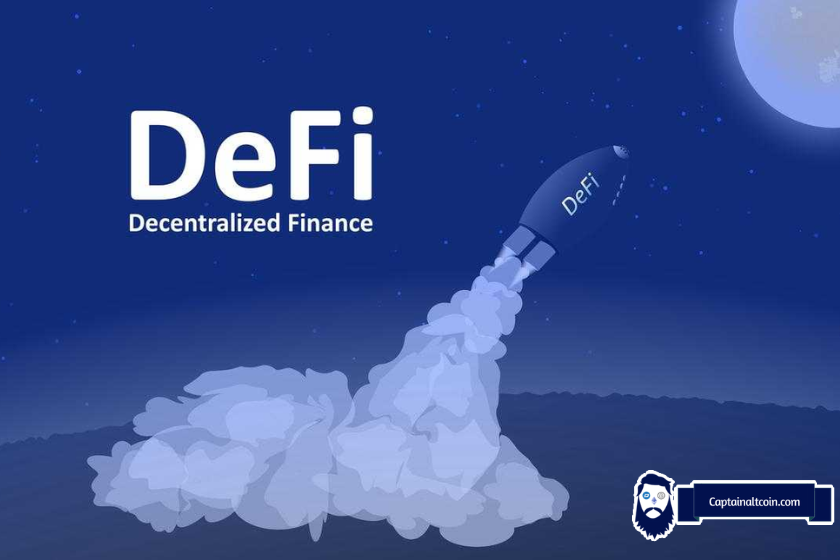
What you'll learn 👉
How is DeFi taxed?
The Internal Revenue Service has not released any direct advice on DeFi specifically, though it does have some general guidance on cryptos. In fact, the agency has been quite clear about how it views crypto, stating that it is property. This means that crypto assets are treated like any other asset, such as stocks, bonds, real estate, art, etc.
In terms of taxation, there are three main areas where crypto differs from traditional finance: custody, lending, and trading. As mentioned above, the IRS treats crypto as property, meaning that it is subject to capital gains taxes upon sale.
You do pay capital gains taxes on interest earned in a savings account. If you lend money, you are still required to report interest payments as taxable income.
Finally, while most financial institutions offer accounts with FDIC insurance, DeFi platforms typically operate without government oversight. As a result, they cannot provide consumer protection measures such as refunds or chargebacks against fraudulent activity.
Do DeFi protocols report to the IRS?
As you are aware, the majority of decentralized financial protocols don’t file taxes with the IRS. However, things can change soon.
Any company that enables a crypto transaction must furnish an infrastructure bill, which President Biden signed in November 2021.
DeFi protocols may not be able to transmit 1099s in their current form, so it is unclear whether or not they will be affected by these new regulations.
After all, due to their decentralized nature, there is no single entity capable of providing reliable reporting on them. This legislation, if passed, has the potential to significantly alter the current state of affairs in the US DeFi ecosystem.
Crypto provisions don’t take effect until January 2024.
Types of DeFi activities
For many DEXs, a liquidity pool is an essential feature to make trading easier. Buyers and sellers who trade on the DEX pay a fee for each transaction which is automatically shared with the members of the liquidity pool.
Yield farming, also known as liquidity mining, is another form of activity in the DeFi sphere that entails looking for ways to make money by taking part in various DeFi projects’ liquidity pools. Different DeFi projects boost the regular income of liquidity providers by rewarding them with their own token as well, on top of the rewards earned through fees.
DeFi lending is also very popular – users borrow crypto from others and receive interest, which they then remit in crypto. It represents a significant advancement in the DeFi market and a mechanism for investors to use their crypto to increase returns.
How to pay DeFi lending and liquidity pool taxes?
There are basically three types of transactions of liquidity pools:
- Adding liquidity
- Removing liquidity
- Realizing a gain or earning new tokens
Changing the liquidity in a pool won’t allow you to avoid paying taxes. In return for your investment in a pool of liquidity, you will get LP tokens. Similar to this, you’ll sell your LP tokens to get your capital back when you withdraw it.
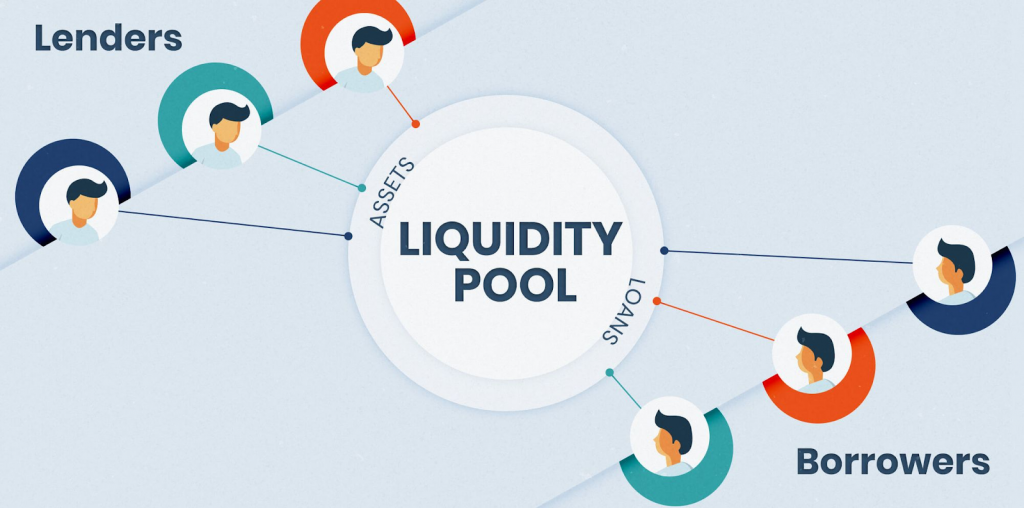
This might be regarded as a crypto-to-crypto trade, in which case there will be a capital gain or loss for both parties, and capital gain tax will apply.
As an example of earning from liquidity pools, suppose you added liquidity to a pool. You receive liquidity pool tokens in exchange for your position in the pool, as well as a percentage of transaction fees as a reward. The worth of your LP tokens rises. Only when you withdraw your funds from the pool will you make a profit. Any profit would be subject to Capital Gains Tax.
You want to add to a Compound lending pool. You will receive tokens representing your capital in the lending pool, and these tokens will gain value as you earn. You do, however, earn new tokens you can claim at any moment. This is considered supplementary income, and you must pay income tax on it.
How to pay yield farming and liquidity mining taxes?
Since yield farming itself may include a variety of transactions, yield farming tax is not an easy task. Regarding the precise taxation, it will all rely on the specific DeFi protocols you have layered or the yield farming protocols you are utilizing.
Capital Gains Tax applies if you make any profit from the sale, exchange, or use of tokens or coins in your yield farming operations. You must pay income tax on any new coins or tokens you receive as a result of your yield farming activity.
How to pay taxes on Borrowing / taking out a crypto loan?
Borrowing crypto-based funds is not a taxable occurrence. Thus, it is reasonable to suppose that crypto loans will be taxed in the same way.
Some DeFi lenders demand that borrowers complete a swap before receiving a loan. For instance, you must swap ETH for cETH in order to borrow ETH on Compound. If this would be regarded as a taxable transaction like other crypto-to-crypto transactions is unclear.
It is prudent to treat this type of loan as a taxable event and to recognize capital gains or losses based on the change in the value of your collateral.
The more aggressive approach would be to see a collateral deposit as a transaction that does not transfer tax ownership to the custodian. This would be non-taxable.
How to pay DeFi staking tax?
This one is relatively simple. Staking is similar to mining in that users provide a service to the blockchain network and are rewarded for it. The IRS has said unequivocally that crypto obtained from mining is considered income and is liable to income tax. Staking is highly likely to be perceived in the same light.
How are wrapped tokens taxed?
The IRS has not yet ruled definitively on whether wrapped tokens are taxable events. However, there are several ways in which people report wrapped tokens for income taxes purposes.
One way is to treat the act of wrapping your existing coins as a crypto-to-crypto exchange. In this case, you’d incur capital gains or losses based on how the price of those coins has changed since you initially received them.
Another option is to treat the wrapped token as a security. If you do this, you don’t pay capital gains or losses because the wrapped token is treated like a stock. Instead, you pay ordinary income taxes on the amount you receive from the sale.
How are governance and incentive tokens taxed?
Governance tokens are becoming more popular. They are used to entice crypto owners to utilize their assets as collateral, allowing “Yield Farmers” to increase their prospective returns.
The idea of governance tokens was popularised by the Compound project. Compound distributes its native token (COMP) to any person who provides crypto to or borrows crypto from the platform.
Ordinary income is reported when you receive governance and incentive tokens comparable to COMP. The income recorded is equal to the market value of tokens at the time they are received.
Your gain or loss on the sale of your governance tokens will depend on their appreciation or depreciation in value since you first purchased them.
How To Pay DeFi Earning Interest Taxes?
The Ethereum blockchain allows for many different types of events to happen on it. An example of such an event is when someone sends you some Ether. This transaction creates a smart contract on the blockchain, which generates an interest payment for you. In this case, we call this event “earning interest”. You receive some Ether, and the amount of Ether decreases over time. As soon as the amount reaches zero, the contract ends, and you receive your interest payment.
If you received 0.1 ETH as his interest reward, you must pay tax on this amount because you earned money. If you had sold the ETH at the time of receiving the interest payment, you would have incurred capital gains tax.
When reporting this event, you need to calculate the current market value of the ETH. To do this, you need to know what the ETH is worth today. Therefore, you must deduct the amount of ETH you received from the total value of ETH in circulation.
How To Pay Gas Transaction Fees Taxes?
Every task carried out on a blockchain network requires users to pay a transaction charge (sometimes known as a “gas cost”). In exchange for the processing power needed to validate the transaction, miners are paid gas fees, which are paid in the local currency of the blockchain.
How to pay play-to-earn tax?
P2E games and their intricacies have not yet been adequately addressed by the applicable tax authorities in the majority of tax jurisdictions. However, there are two scenarios in which playing for money could be considered taxable income: your game rewards are income, or trading your game prizes can result in profits that are regarded as capital gains.
Examples of P2E gaming prizes that could be considered income include:
- P2E’s airdrop
- Staking gaming assets in hopes of a return
- Earning tokens during gameplay
Examples of probable P2E gaming capital gains tax events include:
- A game asset is being sold.
- Replacing one in-game item with another
- Making a crypto in-game asset purchase
How to pay Token rebases tax?
Rebases are not “distributed” via verified, authorized “sends” or “receives” on the blockchain; rather, they are decided by a project’s underlying token mechanics. It is nearly impossible to track these rebases. Check your address on a blockchain scanner if you are the owner of a rebase token. You won’t find any incoming or outgoing transactions in your transaction history to explain the token fluctuations you’ve noticed in your wallet.
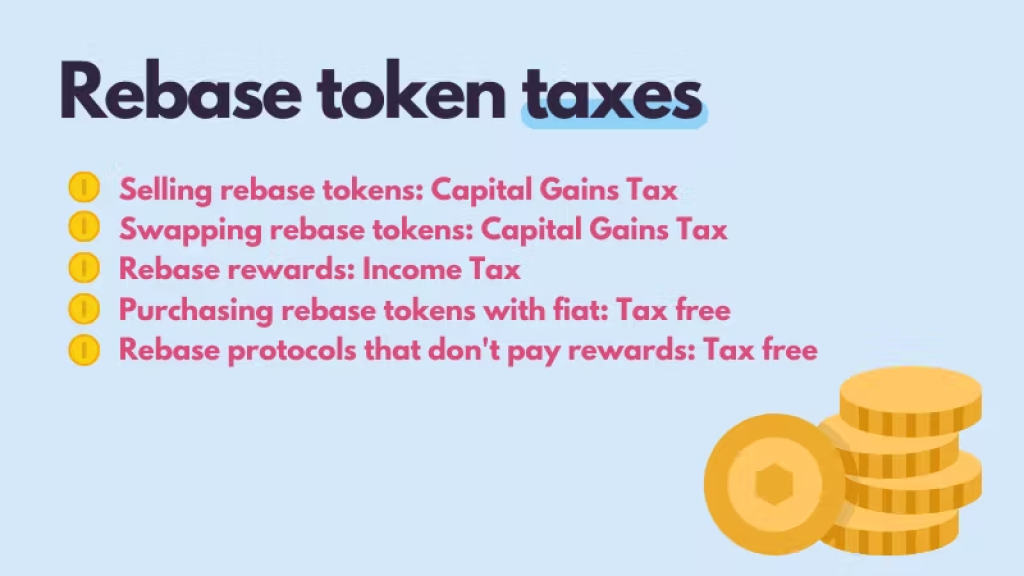
Whether rebase tokens would be deemed income, like ‘staking rewards,’ or whether the profits would only be realized in a capital gains event like a buy or sale is unclear at this time and in most tax countries.
How to pay taxes on Forced liquidations?
Margin calls are a way to keep platforms solvent when the price of cryptos drops too low. When a loan becomes unprofitable, a platform may issue a margin call requiring the borrower to provide additional collateral. This could mean selling off assets like real estate or crypto holdings. If the borrower does not comply with the margin call, the lender may sell the asset to recoup losses.
This process is known as forced liquidation. Forced liquidations occur in two scenarios: when a loan goes into default and when a borrower fails to meet a margin call.
In both cases, the borrower owes capital gains tax on the sale proceeds. Even if the borrower did not benefit financially from the sale, they still owe capital gains tax because they no longer owned the asset.
How to pay Margin trading, derivatives, and other CFDs tax?
The IRS does not have specific guidance for the tax treatment of crypto margin trading, derivatives, and other contracts for difference (CFDs). But it does have general guidelines for how to treat traditional margin trading products and derivative products such as futures, options, and swaps.
Provided you are considered to be trading as an “individual,” you will pay capital gains tax on profits from margin trades and derivatives. This includes interest income earned on margin loans. You won’t pay tax on opening a position, but you will pay tax on closing one and realizing a profit. If you sell shares in a stock market index fund, for example, you will pay tax on the profit realized from selling those shares.
In the case of liquidations like margin calls, this is a disposal from a tax perspective and needs to report to the IRS.
How to pay Taxes on multichain bridging?
Conceptually, bridging is similar to minting or wrapping crypto. In both cases, the user creates a new asset on another blockchain network that is different from the one he/she owns. Bridging cryptos are often used to transfer assets across blockchains.
Certain types of bridging transactions are considered income for tax purposes, so activities involving cryptos are treated as capital gains or losses.
Best DeFi Crypto Tax Software?
For tax purposes, users can keep tabs on their crypto holdings and transactions with dedicated crypto tax software. You can find the five best tax software solutions for us in the text below:
Koinly
The online crypto tax platform Koinly allows you to keep track of all your transactions and generate tax records that comply with all relevant laws. Koinly makes it simpler to keep track of all the details of recording transactions by allowing you to combine your wallets and keep track of activities like trading, mining, staking, lending, and airdrops.
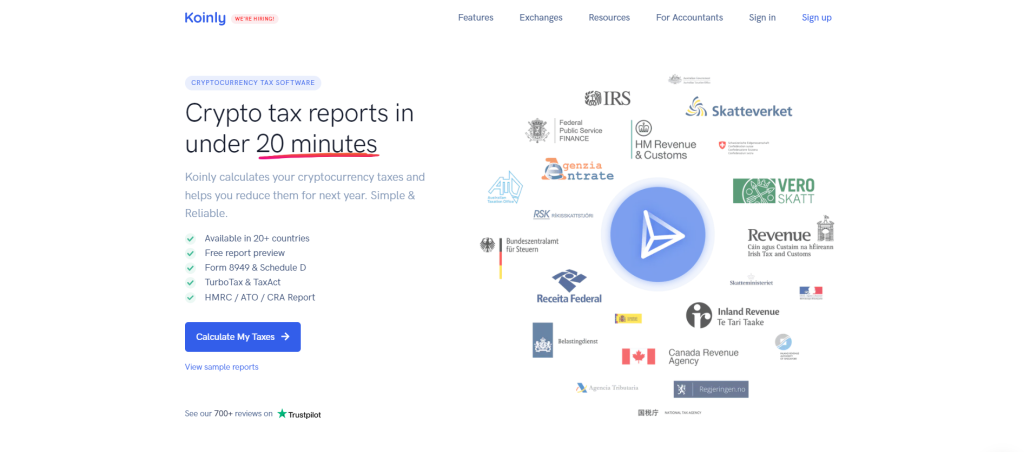
Koinly allows you to manage wallet transfers, follow market prices, automatically import transactions, calculate your crypto gains and losses, and create tax reports.
The platform offers a full crypto tax reporting service and can be accessed in over 20 different countries. It also interfaces with over 6,000 blockchains, 350 exchanges, and 75 wallets. The platform’s base plan is free, however, annual subscriptions cost between $49 and $279.
ZenLedger
As far as crypto tax software goes, ZenLedger is now among the most well-liked solutions. The stated goal is to “simplify DeFi, NFT, and crypto taxation for investors and tax professionals.” Use of this service will benefit your tax preparations because it will provide you with a comprehensive record of all of your crypto transactions and results in one place.

This software is handy if you have crypto trading capital gains or want to collect tax losses.
More than 400 crypto exchanges, 40 blockchains, and 30+ DeFi protocols are all integrated into ZenLedger. This entails that you can add your holdings and transaction history from several exchanges, wallets, and crypto projects to your ZenLedger dashboard.
It has five types of annual subscription plans. The free plan provides up to 25 transactions for $0. The starter plan provides up to 100 transactions for $49. Then, the most popular plan for customers is the premium which provides up to 5000 transactions for $149. Next, the executive plan provides up to 15 000 transactions for $399. Finally, the most expensive and the best plan, platinum, provides unlimited transactions for $999.
CoinLedger
CoinLedger is now among the most popular options for filing taxes related to cryptos, DeFi, and NFTs.The following products can help crypto traders:
- Assisting taxpayers with the preparation and submission of income tax returns
- Keep track of your crypto holdings for free and see how they move
- There is a wealth of resources here to help you learn about crypto tools and taxes, including articles, videos, and eBooks
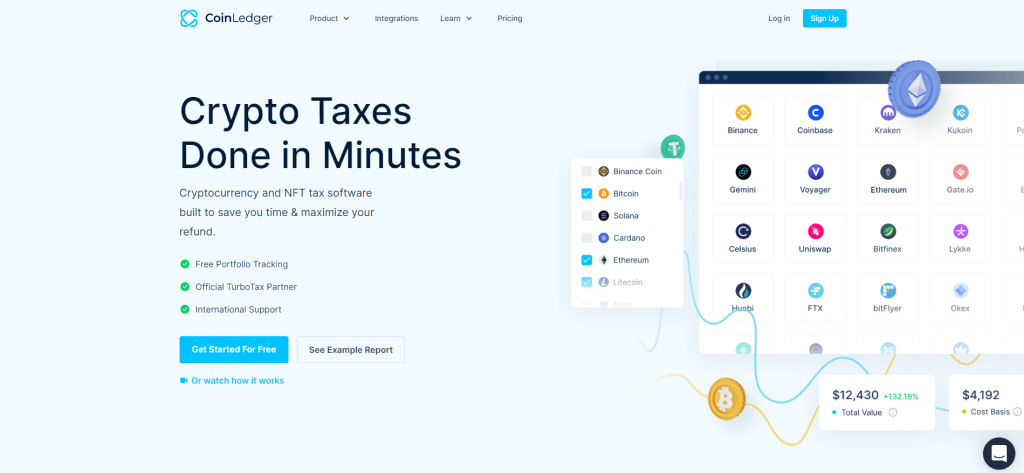
CoinLedger was made for the US market in particular. In time, Australian users were added, and now anyone who lives in a country that supports FIFO, HIFO, or LIFO reporting can use this platform. Easy crypto tax preparation requires only four steps:
- Bring in all of your crypto transactions from every year and every exchange
- Include crypto gains from mining, staking, presents, or airdrops
- After you’ve imported your transaction history and looked over all of your data, you can make your tax report
- You can file your crypto taxes yourself or give them to your accountant to do
It has four types of pricing plans per tax season. First is Hobbyist, which costs $49 and provides 100 transactions. Another is Day Trader, which costs $99 for 1500 transactions. Then there is the High Volume plan, which costs $199 and provides 5000 transactions. Finally, the Unlimited plan has unlimited transactions for $299.
CoinTracking
You can analyze your trades and easily create tax reports in real-time with CoinTracking’s aid. It creates tax reports detailing your coins’ total worth, gains, losses, and profits, both realized and unrealized.
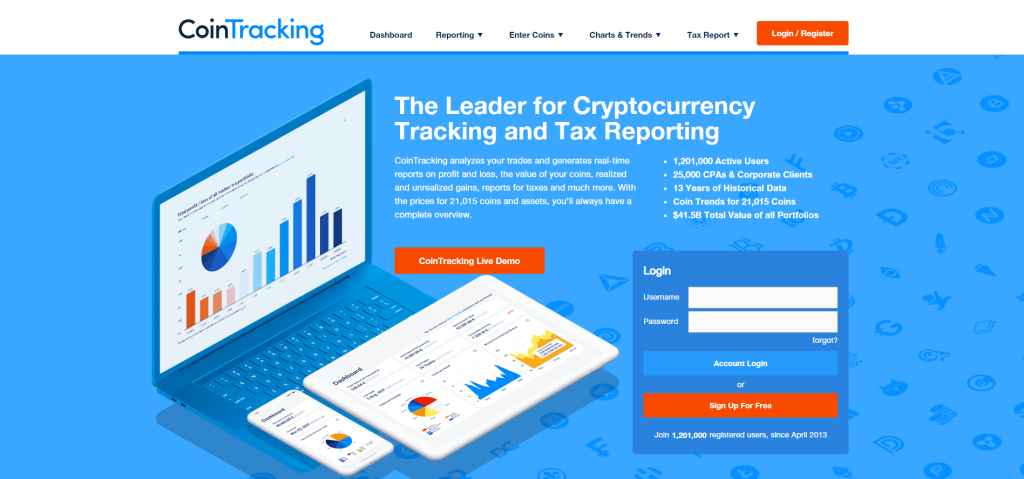
It allows you to track your transactions in real-time, whether you’ve just started investing in cryptos or have been doing so successfully for years. In a nutshell, it reduces the amount of paperwork required by implementing automation.
The tax software instantly downloads each trader’s transactions from their exchanges. Then it generates brief, concise tax records that clearly state how much is owed. The software is also used for Portfolio Management. Professional traders that use many crypto exchanges use CoinTracking to visualize their funds’ status.
Cointracking has four yearly types of pricing plans type. The Free plan is for new crypto investors, and it provides 200 transactions. The Pro plan is for advanced investors, and it provides 3500 transactions for $10.99. Then, there is the Expert plan for experienced investors, and it has three variants. The first provides 20 000 transactions for $16.99. The second provides 50 000 transactions for $21.99. The third provides 100 000 transactions for $27.49. Finally, the last plan, called Unlimited for professional investors, provides unlimited transactions for $54.99.
Accointing
It’s not your normal crypto tax preparation tool, but Accointing is an online platform that enables you to simply manage your bitcoin taxes and portfolio. For both crypto specialists and enthusiasts, this potent solution acts as a one-stop shop for all needs linked to crypto management.

You may track your progress and transactions in real-time with the fantastic user experiences provided by Accointing’s desktop and mobile dashboards. Over 300 exchanges are supported by Accointing, which also offers a simple CSV/API connection for wallet syncing.
Consider Accointing to be a full-service tax report and crypto tracker. Its user-friendly interface is suitable for both beginner and expert crypto holders. The majority of the platform’s capabilities are available to everyone for free, however, preparing tax returns requires one of several modest subscription costs.
There are four types of annual subscriptions. Those are Free, which provides 25 taxable transactions for $0, then Hobbyist, which provides 500 taxable transactions for $79. The Trader subscription type costs $199, and it provides 5000 taxable transactions. Finally, there is the Pro type which provides 50 000 taxable transactions for $299.







